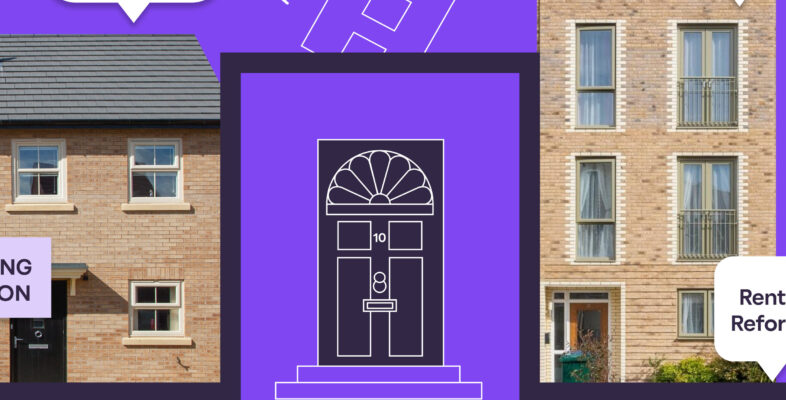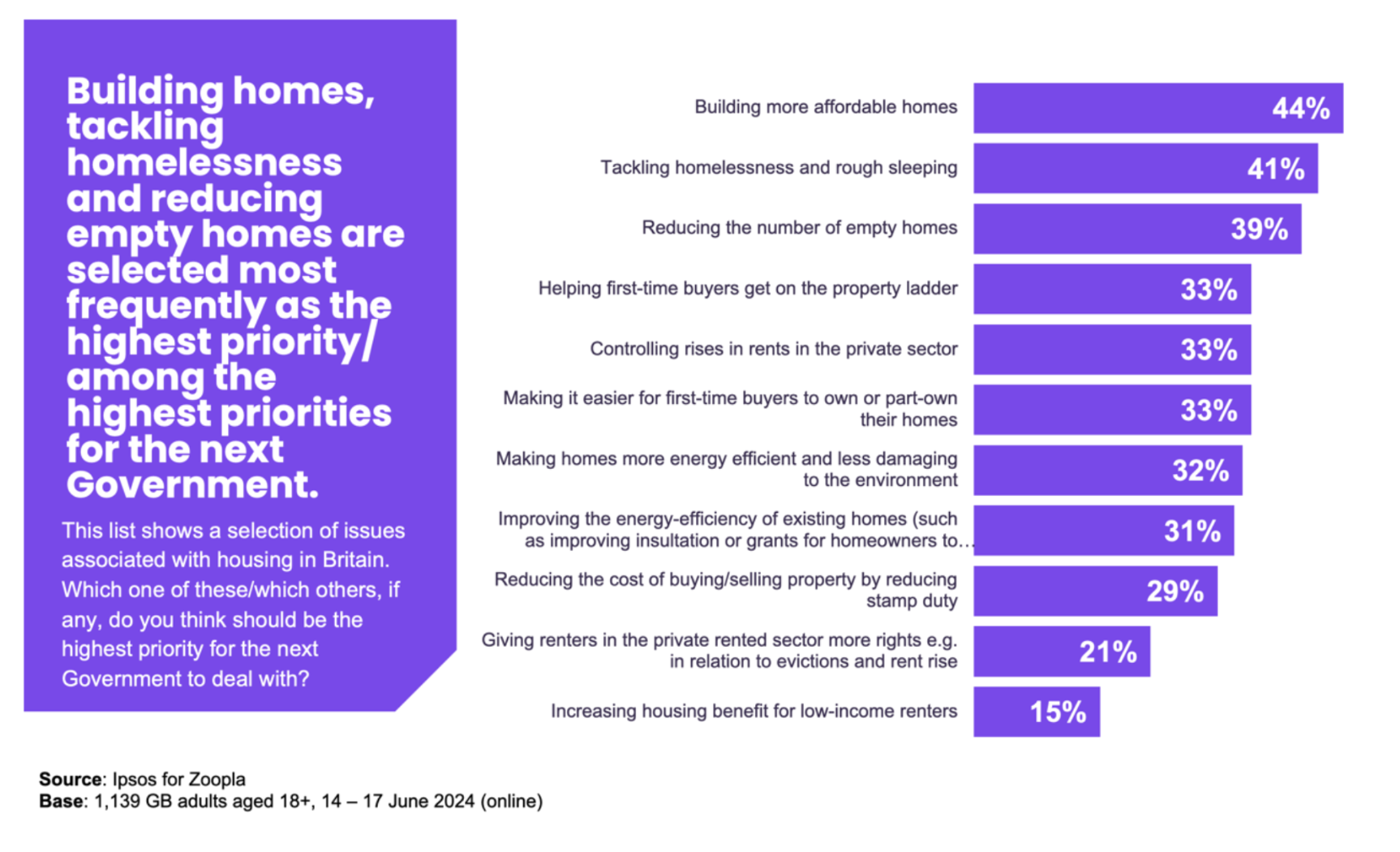Search
close
Stay in the loop with our monthly newsletter, bringing you a fresh take on all things property.
Form funnels into a Pardot list to update Prospect sign up for Estate Agent and New Homes
"*" indicates required fields

Our joint research with Ipsos has revealed that just a quarter of voters agree with the statement that ‘the political parties pay a lot of attention to housing’. The survey investigated voters’ housing priorities for an incoming Government.
According to the research, half of voters (50%) disagree with the statement that ‘there isn’t much Governments can do to encourage the building of new homes’. A fifth (21%) strongly disagree, demonstrating a belief that Governments can make a positive difference to rates of home-building.
The main political party manifestos continue to target 300,000 or more homes a year in England. This level hasn’t been reached for over 40 years, but the numbers have been increasing. In 2023, home building (measured by net additions to supply) fell 65,000 homes short of the 300,000 mark.
However, public opinion is divided about how to fund the building of more affordable housing.
Just over two-fifths (41%) support the idea that increased Government borrowing should be used to fund this. However, only a quarter (26%) are willing to see taxes rise to pay for this, raising the question of how and who should support the funding of future home building at a time when the costs of building have been rising but house prices have stalled.
Voters also care about homelessness and rough sleeping, which ranked as the second priority for the next Government, chosen by 41%. This was followed by 39% who selected a reduction in the number of empty homes.
The highest priority for the rental market is managing the pace of rental growth in the private sector which was chosen by 33%. This was followed by giving renters in the private rented sector more rights, for example in relation to evictions and rent rises (selected by 21%).
The political parties are all aligned on the need for a new Government to deliver rental reforms but measures to manage or control rental inflation are not proposed in England as there is a risk this reduces new investment in homes. Rental inflation for new lets is slowing (currently standing at +6.6%) and on track to fall below the pace of earnings growth in 2024.
Support for first-time buyers featured joint fourth in the list of priorities at 33%, despite this group being the focus of several housing pledges by political parties. First time buyers (FTBs) struggle with the deposit levels to buy a home, often relying on the bank of mum and data for assistance. Even with support for a deposit, the household income to buy for FTBs currently averages £60,600.

Building more affordable homes was the top-ranked priority for the incoming government for homeowners (those buying on a mortgage or owning outright) and social renters, followed by tackling homelessness and rough sleeping.
Increasing housing benefits for low-income renters ranked in third place for social renters. Housing benefit levels have been reset for 2024/25 but the availability of homes for rent for those on low incomes remains a challenge and requires an increase in home building for social homes and private housing.
Meanwhile, for private renters, the number one focus for the next Government should be controlling the pace of rent rises, followed by building more homes and increasing the rights and protections for renters.
“British voters have high expectations from a new Government on housing. The overarching response is ‘build more homes, but other things matter too’.
“People’s experiences and priorities vary based on their position in the market. Renters want more focus on their priorities including raising housing benefit levels and managing the pace of rental growth, while also improving rights and protections.
“Rent reforms are on the agenda for all parties but managing rental inflation is best achieved by growing supply through new home building as measures to control rents can reduce new investment.
“It is clear voters are well aware of the pressures on the housing market with reducing homelessness and rough sleeping and doing more to reduce empty and under-utilised homes in the top 3 priorities.
“Building more homes has the potential to start addressing many of the priorities identified in our survey with Ipsos. We have been getting closer to the 300,000 homes a year level but breaking through will require need a big political push to deliver the homes the nation needs across all housing tenures.”
“Our survey with Zoopla provides the public’s perspective on the next Government’s housing in-tray and how full it is! Expanding Britain’s housing supply is among top priorities, as is more efficient use of existing stock and tackling homelessness.
“This is driven by deeply-held worries – most people think finding a home to settle down in has become harder (something the Prime Minister recognised earlier in the election campaign) and that we are not keeping up with meeting the country’s housing needs. But the survey also finds a sense that the governments can affect change and facilitate an increase in the supply of new homes.”
Fill in your details to get access to this exclusive content.
Fill in your details to get access to this exclusive content.
"*" indicates required fields

Feeling unsure about AI’s impact on lettings? The Zoopla Lettings Advisory Board (ZLAB) simplifies it all with easy-to-digest guides, your AI cheat sheet for the industry.

Everything you need to know about our new marketing campaign

As 2024 starts to wind down, we’re just gearing up. That’s because our biggest-ever marketing campaign launches over Christmas – driving motivated movers to Zoopla agents, at scale.